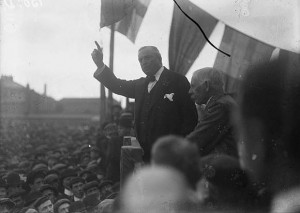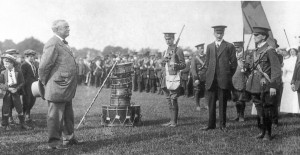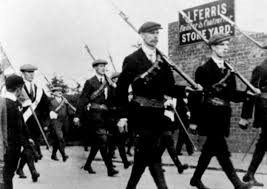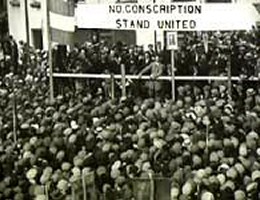Opinion: Did the Easter Rising kill Home Rule?

By John Dorney
It is often argued that the Easter Rising of 1916 killed the compromise settlement of Home Rule, derailed political compromise in Ireland and ushered in nearly a decade of armed conflict that might have been avoided.
The argument, most notably made by former Taoiseach John Bruton, goes like this; Home Rule was passed in 1914 at Westminster, postponed during the First World War but actually implemented in the Government of Ireland Act in 1920. There was, the argument goes, therefore a peaceful gradual route towards Irish independence.
It is often argued that the Rising derailed a peaceful gradual route towards Irish independence and copper-fastened partition.
The armed insurrection of April 1916 therefore was not only regrettable because of the loss of life it incurred, but also unnecessary. Worse, it had wholly malign results, triggering inadvertently a copper-fastening of partition and a civil war between nationalists over the Treaty in 1922.
This argument has much appeal to those who wish de-legitimise republican violence of more recent times and indeed, in the present. But does it stand up to scrutiny?
There are three major problems with this thesis; Firstly, was Home Rule Irish independence? Secondly, did the Easter Rising cause the partition of Ireland? And thirdly could Home Rule have survived other shocks to British rule in Ireland?
Home Rule: Freedom for Ireland?

The Third Home Rule Bill, of 1912 was unequivocal that it was not the concession of Irish independence. It envisaged the creation of an Irish Parliament subservient to the ‘Imperial Parliament’, the latter having the power to, in the words of the Prime Minister Asquith, ‘at any time nullify, amend or alter any act of the Irish Parliament’.
The Bill itself read, ‘The executive power in Ireland shall continue vested in His Majesty the King, and nothing in this Act shall affect the exercise of that power … The Lord Lieutenant or other chief executive officer … shall exercise any prerogative or other executive power of His Majesty.’
The Third Home Rule Bill made a proposed Irish parliament subservient to the Imperial one and placed sovereignty in the representative of ‘His Majesty the King’s preresentative in Ireland the Lord Lieutenant.
The Irish Parliament would not have had the power to alter the position of the Crown and the Lord Lieutenant, the Army and Navy, the making of war and peace, no power to conduct foreign and colonial relations or foreign trade or to mint its own coinage.
Nor could it have collected its own taxes and set its own budget – which would have been set from Westminster. Nor would it have controlled either the British Army in Ireland or the Royal Irish Constabulary. There was scope in legislation for some of these powers to be devolved further. If the Home Rule Parliament returned budget surpluses for three years in a row for instance, it could have applied for further devolution of fiscal powers. After a minimum of 7 years, it could apply for more control over the police.
The Treaty of 1921, whatever its limitations, placed full power over Ireland’s police, armed forces and finances in the hands of an Irish government.
The most cursory look at the Anglo-Irish Treaty of 1921 shows that the years of violence did, in fact, achieve significantly more independence than Home Rule ever allowed. The Irish Free State had its own Army and police, the RIC was disbanded and the British Army evacuated. It collected its own taxes and set its own budget and was free to make its own laws without reference to Westminster (a fact confirmed in 1926). It also printed its own money, although it remained tied to sterling for many decades thereafter.
Whether or not we think it was worth the cost in human life, whether one’s political heritage is pro or anti-Treaty it cannot be argued that the Treaty was Home Rule for slow learners.
Did the Easter Rising cause partition?

A trap some commentators fall into on this question is to assume, like traditional nationalists, that all really was ‘changed, changed utterly’ by the Rising of 1916.
In fact the Rising changed very little about the political scenario that caused partition and the creation of Northern Ireland. When the Ulster Unionists mobilised in arms to defy Home Rule in 1912-13 and when, after the Curragh crisis, it became clear that elements of the British military sympathised with them, it soon became clear that some kind of partition of Ireland was all but inevitable.
Nationalist leader John Redmond essentially conceded it 1914 when he assented to the temporary exclusion of the six north eastern counties of Ireland from the Home Rule Act of that year.
The key date for the partition of Ireland was 1914 when Ulster was excluded from the Home Rule Bill, not 1916.
Immediately after the Rising in June 1916, there were three-way negotiations between Redmond, unionist leaders Carson and Craig and the British government (Lloyd George, then Secretary for war presided) to try to get Home Rule off the ground. They broke down because the unionists insisted on the permanent exclusion of the six county area from Irish self government, which Redmond was not prepared to accept.
In short, Rising or no Rising, for the same reasons as in 1912; fear of a Catholic dominated Ireland, fear for their economic future and fear of being separated from the British Empire, unionists were determined not to be part of a Home Rule settlement.
This reality is as uncomfortable for republicans as it is for neo-Home Rulers, but the truth is that partition was caused by the insistence of northern unionists that they remain a part of the United Kingdom and not because of either British manipulation or separatist militancy at Easter 1916.
Could Home Rule have survived the Conscription Crisis?

If we accept that Home Rule for the south of Ireland was a limited form of self-government and if we acknowledge that it would have had to accept partition, what were the prospects for its leading gradually and peacefully to a fuller form of Irish self determination in these circumstances?
Let’s imagine that Redmond had acceded to Home Rule with partition in June 1916. There would have been an Irish Parliament in place at some time in 1917 with Redmond at its head. The very first challenge he would have faced would have been the British attempt to extend conscription to Ireland in early 1918.
If Home Rule had been enacted for the south of Ireland in 1914, 1916 or 1917, it would very likely have collapsed if asked to introduce conscription for the Great War in 1918.
What actually happened was that both Sinn Fein and Redmond’s Irish Parliamentary Party opposed conscription but it was the separatists that led the mass campaign to it, along with the labour movement. Their success in fighting off compulsory military service was probably the main factor in Sinn Fein’s sweeping election victory of December 1918.
Now let’s suppose that Redmond (or his successor John Dillon) was head of a Home Rule government in early 1918 when conscription was introduced. Either they would have opposed conscription in defiance of the Imperial Parliament and Home Rule would have collapsed, or they would have supported conscription, suppression of the radical nationalists and probably have been discredited in the eyes of their own supporters.
It is very difficult to see a Home Rule settlement getting over this hurdle; a result of what were, in the end, rival national loyalties and interests. By 1920 when Home Rule was introduced for both Northern Ireland and Southern Ireland, it was already far too late. Nationalist aspirations had moved on towards full independence.
To conclude, to imagine a scenario where Home Rule could peacefully have secured independence for all of Ireland we also have to imagine no Ulster crisis in 1912-14, no First World War and a different Home Bill itself.
The Easter Rising may well be blamed for further political violence in twentieth century Ireland, but to imagine that it alone derailed Home Rule as a solution of ‘the Irish question’ is a fantasy.